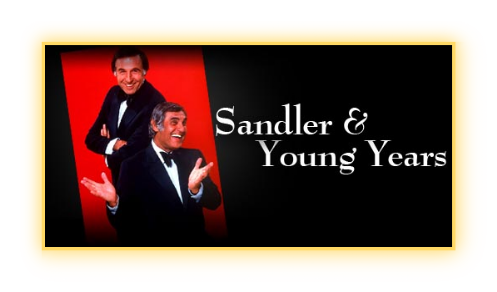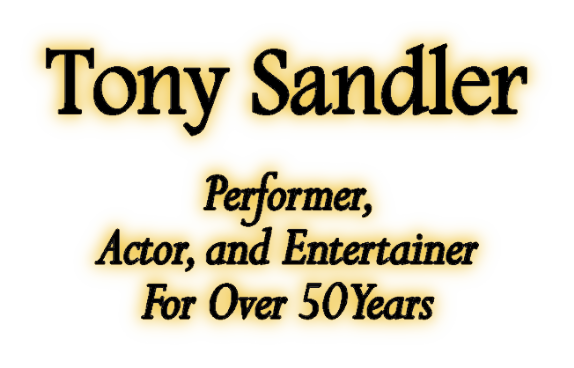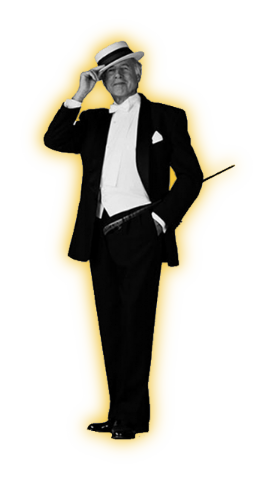
Tony Sandler first came to the attention of American audiences in 1963. Still a headliner at the Café Roma, Tony was recruited in Milan, Italy by American producer Frederick Apcar to be featured alongside American singer Ralph Young who had traveled with Apcar to Italy. Ralph had been the production singer at the Latin Quarter in New York, then owned by Barbara Walters’ father, Lou Walters. Prior to that, Ralph Young, alongside Doris Day, had been the band singer with Les Brown’s “Band of Renown.” Tony and Ralph were to perform with a primarily European cast along with French leading lady, Line Renaud in the Casino de Paris show at the Dunes Hotel in Las Vegas. With Tony's career already well established throughout Europe as a television, film and recording star, and with huge contracts still in his pocket, including the Tivoli Gardens in Denmark and shows in Helsinki, Finland, and with the Café Roma fighting to keep their brightest star, it was a difficult choice.
But the allure of America was strong, and Tony was also eager to expand his horizons. To give himself some time to decide and to get to know Ralph Young better, Tony took Ralph on a European tour through Italy, Switzerland, Austria, Germany, and Belgium. He introduced Ralph to some of his associates, visited a few of the studios where he worked, and viewed sample film and television clips of Tony’s hit performances. Utterly enthusiastic, Ralph exclaimed, “I know a lot of people in America. I could be your manager!” With prospects of broadening his career to include the U.S., Tony agreed to a three-month contract with the Casino de Paris show, and flew from Paris to Las Vegas with Apcar, Ralph, and a cast of 100 dancers, acrobats, jugglers, and magicians. Tony’s first impression of life in the United States was right out of the cowboy movies: The dry southwestern desert, the lights and gaudy glamour and excess of Las Vegas – none of these compared favorably in his mind to the beauty and sophistication of the Riviera where he last lived and performed.
Accustomed to the luxury of performing solo and a complete give and take rapport with his audiences, Tony was quickly disenchanted by the inflexible routine of the Casino de Paris. He longed to return to Europe to fulfill his contracts there, but he was still under contract with Apcar. Out of boredom Tony started improvising with songs back stage. He played his guitar, sang a few European ditties, and Ralph joined in with some American tunes. Soon they were figuring out how to combine the two. A mix of quod libet and contrapuntal musical styles, juxtaposed with humor derived from their European and American cultural differences became the basis of the singing act for Sandler & Young.
Tony’s many languages and continental charm contrasting with Ralph Young’s Americanisms made for intelligent yet delightful humor. With the unique blend of their two baritone voices, these tall and dashing young men were about to create a musical entertainment sensation. But the Sandler & Young act was not yet established. The Casino de Paris was a complete hit, and Apcar upped the anti and extended both Tony’s and Ralph’s contracts to a year. It was during that time at the Dunes with the Casino de Paris that Tony noticed a regular visitor to the show. His name was Elvis Presley – not yet at the height of his career. Elvis got to know Tony and Ralph, and frequented their dressing room. In truth he was there to meet a girlfriend, one of the beautiful French dancers in the show. Tony recalls the remarkable success Elvis achieved through the years, and was very saddened when this young icon died so prematurely. Tony witnessed the rise, and the demise of this very talented young Americans due to enormous pressures, and to greed and mismanagement on the part of his entourage.
Before the year was over Apcar offered Tony and Ralph each a contract for another year, but by that time Tony and Ralph had decided to give their own act a try. The thrill of this new venture was intoxicating, and the persistent offers from Europe were losing their allure. Tony and Ralph left the Dunes and began performing as Sandler & Young for the first time with a cameo performance within the Folies Bergere show at the Tropicana Hotel in Las Vegas. Soon Sandler & Young were booked as a lounge act in various venues in Las Vegas, Reno, and Tahoe. It was while Sandler & Young were performing at the Las Vegas Sahara Lounge that comic legend Phil Silvers first saw them perform. After his own show in the Sahara’s main room he announced, “I don’t know what the rest of you are doing after my show, but I’m going to the lounge to listen to that hot new singing duo, Sandler & Young.” Their shows were packed from that night on. Phil then persuaded Polly Bergen, the beautiful and versatile actress/entertainer then married to producer Freddy Fields, to use Sandler & Young in her musical variety show at the Desert Inn in Las Vegas. Sandler & Young remained with Polly when in 1965 she took her show to the famed Persian Room in New York’s Plaza Hotel.
While still performing in Las Vegas, Phil Greenwald booked Sandler & Young to perform at the Concord Resort Hotel in the Catskills. Val Irving, a successful personal manager, was staying at the Concord and saw Sandler & Young perform. Val was then managing a stable of artists that included Audrey Meadows (from Jackie Gleason’s Honeymooners show), comedian Jackie Leonard, and star tenor Robert Merrill. After the show Val came backstage with tears in his eyes. He said, “This is the best singing duo I’ve heard yet,” and he started to talk business. “If I can’t book you, you don’t owe me a cent!” Val would go on to make a lot of money with this new act, and was largely responsible for putting Sandler & Young on the map.
Beatle mania hit the U.S. in the mid-sixties, and the popularity of this British rock band created a frenzy of excitement. By 1966 The Beatles were churning out numerous recordings, and the subsequent rush for their albums was so huge that the record pressing companies stopped all production for other artists to concentrate on meeting the demand. This was a serious setback for every American recording star at the time. But fortunately the demand for live entertainment in those days was still strong. Sandler and Young survived the invasion with their unique niche in the marketplace.
In 1966, Sandler & Young were back at the Persian Room starring in sell-out shows. Alan Livingston, President of Capitol Records, “discovered” Sandler & Young during one of those shows, and signed them to a long-term contract with Capitol Records. Thus, the duo began a rapid rise to worldwide stardom. At Capitol they joined an exclusive stable of performers, including Nat King Cole, Peggy Lee, Lou Rawls, and Nancy Wilson. Sandler & Young quickly topped the charts with their mega-hit single, Dominique, and continued with an astonishing output of popular Sandler & Young recording albums, with millions sold. Under the supervision of Capitol’s top A&R (artist and repertoire) man, Dave Cavanaugh, Sandler & Young were assigned a brilliant team of musical arrangers, including Billy May, Joe Cribari, Jimmy Jones, Luther Henderson, Sid Feller, and Bob Bain. Tony and Ralph were often brought in to work with the arrangers, adding Tony’s own linguistic and musical knowledge along with Ralph’s American savvy to the mix for arrangements that remain fresh and unique today.
Now the hottest act on the entertainment stage, this debonair duo returned to Las Vegas and packed houses. At that time Bill Miller and Jack Entratter were legendary as the top show producers in show business, both fiercely opinionated and feared by artists who needed their approval. Bill Miller contracted Sandler & Young to headline in the main room at the Flamingo. Well known comedian, Myron Cohen opened their show, while Kenny Rogers performed in the Flamingo lounge. Right next to the Flamingo was the Sands Hotel where Jack Entratter had booked what became known as the “Rat Pack” in the main room. Louis Prima and Keely Smith played the lounge. Both venues commanded the lion’s share of entertainment draw on the strip. Tony was younger but not a stranger to the pack, and of them all – Frank Sinatra, Sammy Davis, Dean Martin, Joey Bishop, and Peter Lawford – Tony got to know Sammy the best. Later, while Sandler & Young were hosting a show in London where Nancy Sinatra was performing, Frank would call both Tony and Ralph regularly to check on how his daughter was faring. Las Vegas was a well-oiled machine run by the Mafia. They knew their clientele, had a sense of propriety, and kept the shows on the main strip “clean.” Tony recalls that a sign was always posted in his dressing room that warned: “No Blue Humor.” And they meant it. This was fine with Tony, and to this day Tony stays away from “boy humor” and sticks to a higher road.
With their reputation well established, Sandler & Young were a popular act on stages throughout the United States. One of their contracts was with Bill Harrah’s Hotels in Tahoe and Reno, and Bill became an ardent fan. While Tony and Ralph were performing in his hotels, Bill treated them like royalty and gave each their personal use of a Rolls Royce (in the color of their choice), and a house complete with three servants and a cook. Such was the status of top entertainers at the time.
Sandler & Young were already a sellout in the biggest showrooms, the most prestigious nightclubs, and the then very popular 3000-seat theatres-in-the-round across the nation when television made them stars in every living
room. Sandler & Young made frequent appearances on the top-rated variety shows of Johnny Carson, Ed Sullivan, Red Skelton, Andy Williams, Merv Griffin, Mike Douglas, Dean Martin and Milton Berle.
room. Sandler & Young made frequent appearances on the top-rated variety shows of Johnny Carson, Ed Sullivan, Red Skelton, Andy Williams, Merv Griffin, Mike Douglas, Dean Martin and Milton Berle.
The 1969 season of NBC’s Kraft Music Hall show was broadcasted on television from London with Sandler & Young as hosts. Appearing with them weekly was a virtual Who’s Who of stars from the entertainment world, including Lena Horne with whom Tony had performed at the Palladium in London. Other entertainment stars included some of Tony’s friends: Vincent Price, Ella Fitzgerald, Victor Borge, Nancy Sinatra, and Frank Gorshin, alongside comedians Norman Wisdom, Terry Thomas, and Sid Caesar.
Tony was happy with his successes in America, was grateful for the magnanimous reception given him by the American public, and had a growing affection for American democracy and what he calls the freshness of the American spirit. In a heartfelt gesture he studied for citizenship and in 1971, he was sworn in as a citizen of the United States of America. Tony recalls a performance shortly thereafter when Ralph stopped the show to present him an American flag that had been flown over the U.S. capitol building. U.S. Representative Donald W. Riegle Jr. from Michigan had sent it as a gift to Tony. There was not a dry eye in the house.
The easy excesses of Vegas were the downfall of many stars in those days, and every vice was certainly offered and made available to this handsome European. But still in his athletic prime, Tony chose to spend most nights after a performance on the tennis court. Starting around two o’clock in the morning he would engage in several vigorous sets with other celebrities. Bill Cosby offered a frequent competitive match, and a professional friendship developed. “He could have beat me at any time,” Tony confesses.
Quite suddenly in 1983 Ralph Young announced he was retiring, thus breaking up the Sandler & Young act. Perhaps the thrill or glamour of entertaining had lost its allure, but more likely the unbelievably demanding pace became too much of a price to pay. Fifteen years older than Tony, Ralph was ready to sit back and smell the roses. Ralph moved to Palm Springs where he lived to be 90 (Ralph Young died on August 22nd, 2008). Tony, still strong and youthful for his forty-nine years, had plenty of energy and talent yet to share with his public. Thus, the door opened for Tony to begin a new phase in his own career. It was simply a question of what route to take in his new country. Since that time, Tony's career has extended into avenues of entertainment he could not have imagined. Tony reflects, “Those were eighteen glorious years of my career with a man whom I cherished and admired. Ralph had a terrific sense of humor – he really was funny. He shared his extensive knowledge and savvy about our business, and had one of the most robust and beautiful bass baritone voices I ever had the privilege to harmonize with.”








